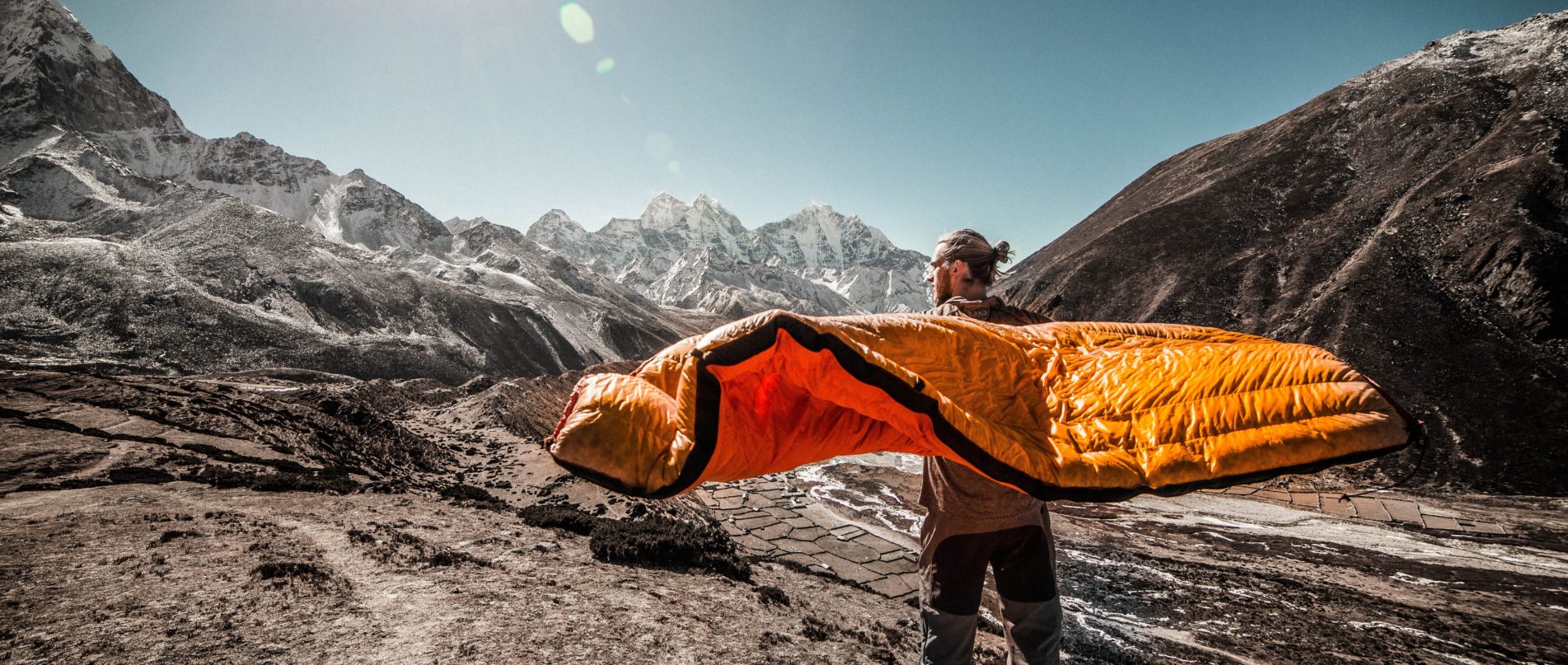
Prompt Images
When George Mallory set out for the first recorded ascent of Mount Everest, a reporter for The New York Times asked him why.
“Because it’s there,” he replied. Now, game recognize game. And Mallory’s response is so snarky, with so few fucks to give, that it captures the audacity of the kind of person who would set out to climb Everest before anyone else had. The balls on this guy.
“Because it’s there” is the response you might get after questioning someone who tries to justify a seemingly unjustifiable act. And while it might be funny, “Because it’s there” is also a cop out.
Yes, with all due respect, I did just challenge the legendary George Mallory’s equally legendary response. Because although Mallory was known for his way with words and poetry, he lacked the ability to describe his reasoning. “Because it’s there” doesn’t cut it for me. And though I definitely have no business trying to put words in the mouth of such a great mountaineer, I have also been questioned many times by friends and family to justify some of my own exploits. Until now, I have usually just rattled off Mallory’s famous three words to snub the question because I was too lazy or didn’t care to really dig into my rationale. It’s dismissive. It’s a denial. And it doesn’t answer the most important question.
Why do we do anything?
Our motivation to do great things is deeply personal. Is it for the glory? For the money? For the love? Can I run the distance? Can I climb this rock? Can I find a way to jump off this ledge? These questions of self-exploration and the drive for constant improvement are raw and part of being human. If we didn’t have this built into our psyche we would likely still be wandering cavemen.
If the answer to why any person sets goals and chases them relentlessly was truly “because it’s there,” we’re missing a key piece that helps us understand each other. And if we all default to a “because it’s there” line of response, then there’s no explanation of how extraordinary people do extraordinary things.
Take Kilian Jornet, who recently set out to summit Everest—the same peak Mallory sought—for the second time in a week. Jornet set the fastest known up Mount Everest completely self-supported. He came down and did it all again a week later. More than how he did it, don’t you want to know why?
“Because” is not an answer.
“Because it’s there” is just an intro line, it’s not the story. “Because it’s there” is the build up, not the crescendo.
“It” being “there” sets the stage, controls the lights, and plays the background music. But you are the one center stage, and you decide what happens with your mind and body when you are put on center stage and the curtain draws. This is the case 100 percent of the time, absolutely, without exception. No matter what your discipline may be: football, hiking, dancing, working, rugby, running, climbing, skydiving, golfing, BASE jumping, cycling, anything that engages mind or body.
The “Why?”
Mallory and Jornet were both explorers of the world and explorers of themselves. They strived not only to get out of their comfort zone, but to push the limits of human capability. They both set out on a journey to explore what they’d do when they put themselves in a place—physically, mentally, and emotionally—that they have never been before. The “why” doesn’t have to necessarily be a long distance, heavier weight, or faster time, but it comes in curiosity in on self and wondering(and truly not knowing for certain) if you can do something. They’d face countless uncertainties, Jornet and Mallory but they wanted to find out how they’d react, persevere, and whether they could survive. And to find out, they had to get out of their comfort zone.
Being out of your comfort zone has a beginning, middle, and an end. It’s a growth process with steps that take you from where you are now to—whether you succeed or fail—aspirational new heights. And surprisingly, the beginning and the end are the easy parts.
First comes the commitment.
You plan, practice, and put in countless hours of training. Some days are good by your standards, others are bad by the same standards. But no matter what, you’re always working toward the goal. You arrive at the start of the competition, or park the car at the trailhead, or stand at the edge of a cliff, or you take that first step onto the rock. Though it has taken a lot of time an effort to get to this point, this is the easy part.
The end is also fairly easy.
The end comes at the finish line, when you decide to stop, when your body forces you to stop, or when your heart rate comes back down and you regain your composure. Whether successful or not, the thing you set out to do is done. Complete. Finito. To bring it back to our aforementioned situations (and to put it bluntly), Mallory is frozen on North Ridge, Jornet is up and down twice. Both are efforts are done.
The magic answer is right in the middle.
That fleeting, asymptotic moment when you decide how things will end. How do you react? Who will you be?
This is often WHY you sign up for a challenge. You want to figure out how you’ll react when that magic middle moment shines a mirror at you. For that half-a-microsecond, it shows you the inner depths of your soul. The hairs on the back of your neck stand up, and that delicate chill develops in the back of your skull and runs down your spine. It lasts for such a short period of time, but when it happens it seems to last forever. In that precious twinkle of moment you get to see yourself in the rawest form.
The catch is that you never ever get to pick when these moments come. You can train every waking hour in hopes to have a great race or perform perfectly, but the outcome or ending ultimately is a product of what you decide to do in the middle of the fight—right after you finish scrolling through all the excuses of why you shouldn’t go for it.
Maybe you’re waiting for the timing or the day to be perfect. Maybe you wished you trained differently. Maybe it’s too windy or too hot or too cold. Excuses give reasons “why not” to do something. Most of the time, they’re reasonable and rational. They make sense. And that’s why these excuses win out most of the time.
But if you keep making excuses, chances are that you’ll begin to identify yourself with the reason why you can’t do something. Once you identify with something so deeply, whether good or bad, you begin to let those excuses, those reasons you can’t—or worse, those times you failed—define your potential. And once that happens, you can sit your ass down firmly, grab a cold one and welcome yourself into the life sucking, vicious circle, of your #ComfortZone.
The Feeling: The moment you decide to expand your comfort zone.
But hot damn, when that perfect combination of training and challenge presents itself, and you choose to be great with a “no excuse will stop me” mentality, it’s other-worldly. For those rare occasions, those moments are exactly “why you do this.” That chain reaction—a subconscious feeling that you can touch the stars, fly in space, or that you could die (actually fucking die).
It’s not fearful; it’s liberating. Because even if you did die in that very moment, you’d die in the happiest state, living to their your potential. In flow. In the zone. In the moment. Doing this thing just for the pure sake of doing it. Time does not exist. Your body and mind are in complete sync, effortlessly combining thoughts and actions. They are synonymous and interchangeable. You evolve..
We never notice these feelings when they take over, and we can’t truly appreciate them in the moment. But, it is what makes world records, personal bests, knock-out punches, and olympic champions. You’re engulfed in the feeling, and your instincts take over. You are free to be you. Only in retrospect do you get to honor the moment. And make no mistake, you will crave it…
No, you cannot choose when those moments come. But, you always choose what you do in those moments. And in the end, those decisions are who you are. Because actions speak louder than words, those decisions define why you do what you do. And because they are the manifestation of you at your very best, those moments represent you at your highest potential. You can’t fail. You’re invincible. You’re alive.
But you’re still mortal and human. Which is what makes this whole evolution so beautiful. Because the stakes are high, especially when you have such purpose. Especially when you’re becoming yourself.
Mallory’s body was found 75 years later about 1,000 vertical feet from the summit of the world’s tallest mountain. He never made it to the top of Everest. Did he evolve? Did he find his motivation? Did he find himself? We don’t know the answers. But Mount Everest is still there.
All posts in The Prompt’s #ComfortZone series are brought to you by our rad friends at 
Like what you read here? Tweet us or comment on our Facebook page!



